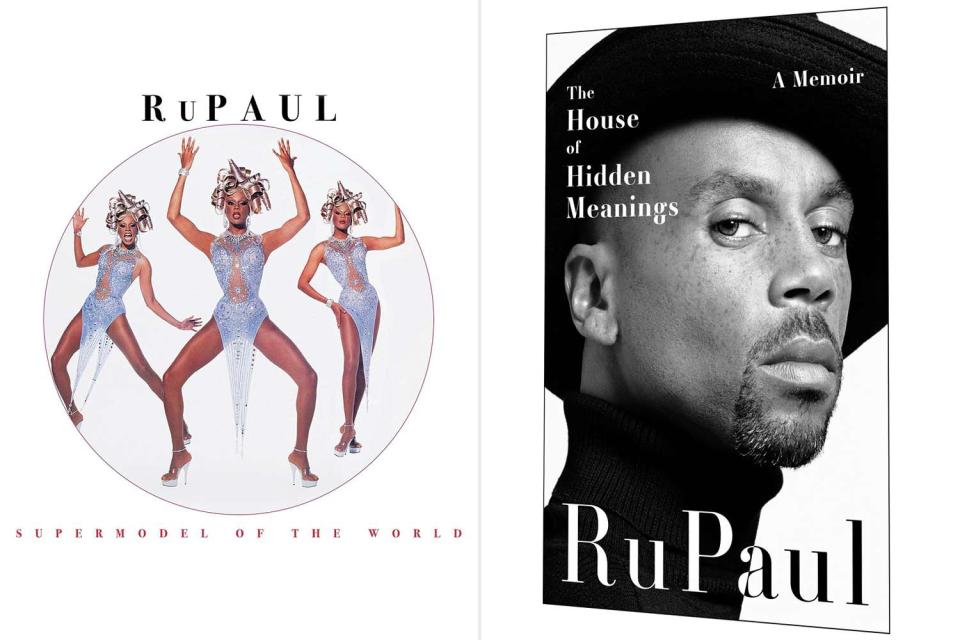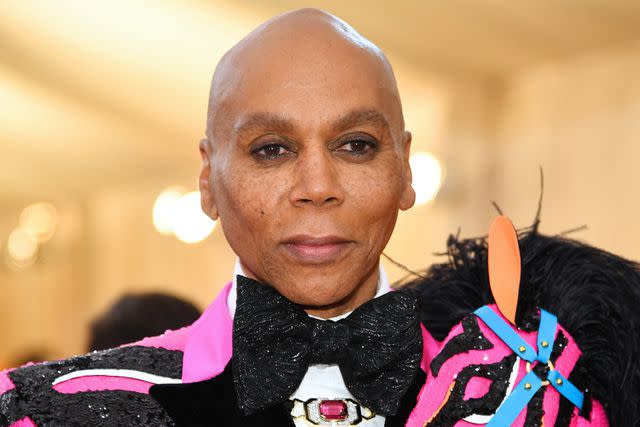How RuPaul Became a ‘Supermodel’ — and How His Mom ‘Mean Miss Charles’ Reacted (Exclusive)
- Oops!Something went wrong.Please try again later.
- Oops!Something went wrong.Please try again later.
In an excerpt from his new memoir 'House of Hidden Meanings,' RuPaul shares his drag ethos that draws on Diana Ross, Cher, Dolly Parton, and a little Walt Disney

RuPaul Charles — known to most as RuPaul, host of the 29-time Emmy Award-winning reality competition show RuPaul’sDrag Race — has picked up a few maxims over his 63 years.
“Don’t take life too seriously” he got from the drama teacher at his San Diego high school. “If you can’t love yourself, how in the hell you gonna love somebody else?” ends every episode of Drag Race. And then there’s this gem: “You’re too goddamn sensitive and reminisce too much.” That one came from his late mother, Ernestine, who died in 1993, and whom the neighborhood kids called “Mean Miss Charles.”
In a way, his mom's advice went on to shape RuPaul's entire life — and career. “I learned she was actually telling on herself," RuPaul tells PEOPLE. "That sensitivity shaped my intuition and my instinct. The reminiscing I could probably do without.”
The 6-ft. 4 in. (without heels) future drag performer’s destiny started with a prophecy. When Ernestine was pregnant with him, a psychic had told her that her boy was going to be a star. Ever since then, RuPaul says he felt “anointed” by that promise and has spent his life working to fulfill it.
Below, in an excerpt from his new memoir The House of Hidden Meanings, he reflects on how his drag persona came to be and what "Mean Miss Charles" thought of it all.

The eighties, particularly in New York City, are remembered for being an era of excess. At the time I started to embrace it, drag was a political statement; depending on the context, it could be read transparently as a middle finger to the consumerist, normative culture of Reagan and his followers. By the dawn of the nineties, the culture had only doubled down on the worship of wealth, beauty, and glamour that dominated the eighties. I didn’t have money, but I could serve sex and fashion—no problem.
I adopted a drag aesthetic that was striking and seductive—a style that I described at the time as somewhere between “Black hooker” and “Soul Train dancer.” My proportions were just right for it: long, long legs and a tiny waist that I didn’t have to cinch. I didn’t need to wear stockings. I’d put on a bra, or even just a pair of rolled-up socks in a bra, and call it fashion. I’d wear short skirts or tube dresses that I could whip up on a sewing machine, do big Donna Summer hair, big lined lips, huge eyelashes, and trashy earrings.
The culture at the time was obsessed with supermodels, a fascination that had been bubbling for years. Fashion at that time celebrated the most elite forms of beauty, these long-limbed, superhuman beings who exemplified glamour.
In Milan, a friend pulled strings to get us into a Versace fashion show; we had last minute seats in the back of the bleachers. The experience was exhilarating, and it ended with the four biggest supermodels in the world stalking out in oversaturated dresses: Linda Evangelista, with a platinum-blond pixie, in shocking red; Cindy Crawford, hair bouncy and shiny, in a black halter; Naomi Campbell in electric yellow; and Christy Turlington, coquettish in a little black dress. They were mouth-ing the words to George Michael’s “Freedom! ’90.” They were perfection. When you looked at them, you could hardly breathe.
For more on RuPaul and how he became an icon, pick up the latest issue of PEOPLE, on newsstands Friday, or subscribe here.
Gazing down at them from the back of the venue, I wanted to be just like them.
The next fall I was back in Milan for the Versace show. This time, Gianni Versace had flown me there to perform at the after party. During the show, he brought me backstage. I took a photo with the models, wearing a bright blond wig and a skintight dress. Naomi Campbell is at my feet. Christy Turlington is gazing up at me. And I’m grinning with delight, like I always knew this moment would come.
I had always felt that my path to stardom would have to be through music, not acting; there was not yet a place in Hollywood for someone like me. Hollywood didn’t “get” different then, any more than it does today. If I made enough of an impact with music, I thought, maybe I could transfer those credits to film and television.
When Jimmy Harry and I listened to [‘Supermodel,’] there were some funny lyrics inspired by Linda Evangelista’s famous quote about refusing to get out of bed for less than $10,000 a day. But the best thing about the song was the title. We took that idea, which felt like it was right in the zeitgeist, and started writing our own version.
Related: Who Is RuPaul's Husband? All About Georges LeBar
Now I can see that everything was building toward this. Everything I experienced—the highs, the fears, the joys, the lows, the discoveries—had shaped me into the force I would become. This body, with its supermodel proportions, that had always stood out, that had never been masculine enough for the world? Now it had its purpose. The love of performing that I had honed as a child to make my mother laugh? Now it would take its rightful place on the global stage. Even the fact that I’d always had an uneasy relationship to sex—now that would become my superpower.

Dimitrios Kambouris/Getty Images for The Met Museum/Vogue
RuPaul at the 2019 Met GalaThe drag scene I’d come of age in was always raunchy, sexually charged, blue. What if I took all that and made it mainstream? What if I made it so fun, so likable, so family-friendly that you could show it to your grandmother? What if I brought the same glamour that had enraptured me in that Versace show to every appearance I made—but I did it with a wink, a winning smile, and the spirit of sweetness that I’d always found irresistible in others?
When I was standing in a pizza parlor on Sixth Avenue and I heard “Supermodel” playing on Z100, it wasn’t a surprise. It was like the most obvious thing in the world. The single wasn’t a hit on radio. It didn’t even crack the Top 40. But in that time the RuPaul idea was born, and people outside of my world were inspired to talk about me and androgyny and drag in a way that was unprecedented.
Related: RuPaul Launches Online Book Marketplace and Book Club: ‘Knowledge Is Power’ (Exclusive Interview)
I’d mastered the art of naughty-lite: two spoonfuls of Diana Ross, a pinch of Cher, a shake of Dolly Parton, all sealed with Walt Disney’s family- friendliness. Before, I had been blurry — confusing, a thing that only some people could understand. Finally, I had snapped into focus, just in time for the whole world to see.
After “Supermodel” came out, MTV News wanted to do a segment on me. I laid out my philosophy for the veejay. “Everybody is a drag queen,” I said. I quoted the queen that Mark had told me about all those years ago in Atlanta: “You’re born naked, and the rest is drag.”
The next week, I went back to see my mother in San Diego. I knew that she was dying. We turned on MTV and watched as the segment aired. She gazed in awe, and then she looked at me. "N****, you are crazy.”
It was such a simple thing to say—there was nothing to it. But underneath it was an ocean of hidden meanings. In her voice, I heard the victory lap that she was taking even as she lay dying, in being my mother. It was the same living room that I had performed for her in — And now I was on that screen! I could think of no greater magic than that. I felt, in that moment, that there was some divine force at work that had nothing to do with either her or me, in which we were merely players.
From the book The House of Hidden Meanings: A Memoir by RuPaul. Copyright © 2024 by RuPaul Charles. Excerpted by permission of Dey Street Books, an imprint of HarperCollins Publishers.
For more People news, make sure to sign up for our newsletter!
Read the original article on People.

